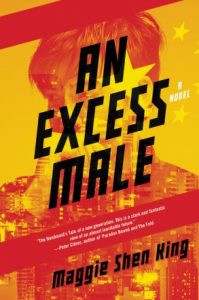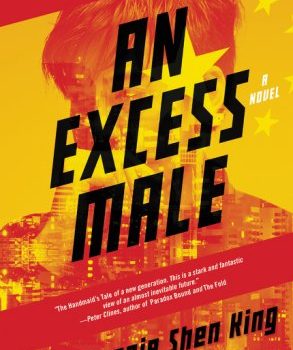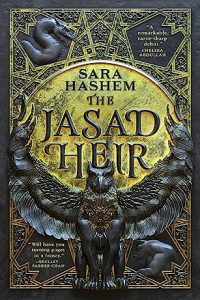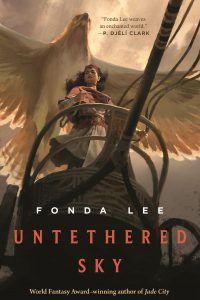Rachel Swirsky Reviews An Excess Male by Maggie Shen King
An Excess Male, Maggie Shen King (Harper Voyager 9780062662552, $15.99, 416pp, tp) September 2017.
 Wei-Guo is An Excess Male. One of a huge population of unmarried men in China, Wei-Guo has never slept with a woman apart from his weekly government-allotted sex worker. Finally, at 40, he and his fathers have saved enough money for a small dowry, just enough to attract the attention of May-Ling and her two husbands, Hann and XX.
Wei-Guo is An Excess Male. One of a huge population of unmarried men in China, Wei-Guo has never slept with a woman apart from his weekly government-allotted sex worker. Finally, at 40, he and his fathers have saved enough money for a small dowry, just enough to attract the attention of May-Ling and her two husbands, Hann and XX.
The conceit of An Excess Male by Maggie Shen King relies on Chinese demographic data. The text on the author’s website states that the ‘‘premise of the story is based on actual statistics. Initially conceived to control overpopulation, China’s One Child Policy will by the year 2030 unintentionally create a society in which more than 25% of men in their late thirties will never have married.’’ Sometimes called the ‘‘girl crisis,’’ this argument rests on the idea that the one child policy has combined with patriarchy to radically incentivize and increase sex-selective abortion and female infanticide.
While these things inarguably occur, the ‘‘girl crisis’’ is a contested concept. Experts disagree on the interpretation of the data, its probable outcomes, and its causes. It’s a complex argument, and not one I’m qualified to resolve.
Even if one believes King’s interpretation to be incorrect, however, science fiction often extrapolates from possible but unlikely scenarios. Soylent Green – also responding to demographic shifts – is far-fetched but an impactful engagement with contemporary social anxieties.
Nevertheless, I was hesitant to pick up a novel about this conceit because most such stories I’ve read tend toward post-apocalyptic fantasies, and rarely engage more than superficially with Chinese history and culture. I’d found an exception, though: ‘‘Ball and Chain’’, a short story published in Asimov’s in 2014 – written by Maggie Shen King. ‘‘Ball and Chain’’ is the first chapter of An Excess Male and can be found on King’s website at <maggieshenking.com/ball-and-chain/>.
In King’s near-future China, the government has dramatically rearranged society around the ‘‘excess’’ population of men. To encourage Chinese ethnic purity and discourage the importation of foreign brides, the government has incentivized the marriage of multiple men to a single woman. Wei Guo, having a relatively small dowry, can only expect to be a third husband.
All the characters are trapped by the government’s restrictions. Wei-Guo begins with little hope of finding a family. May-Ling was raised as a commodity and auctioned to marry brothers Hann and XX. The brothers themselves, respectively gay and autistic, risk imprisonment, institutionalization, and possibly even sterilization if anyone outside the family discovers their secrets.
An Excess Male is distinguished not only by interesting cultural extrapolation, but also by exceptional characterization. Wei-Guo and all three members of his prospective family – May-Ling, Hann, and XX – are viewpoint characters. Each is sharp, distinct, and deeply flawed as they struggle with dissatisfaction and alienation. May-Ling wants Hann sexually, but he is repelled by touching her. XX is heterosexual, but neither he nor May-Ling enjoy the sex mandated by their marriage contract. Wei-Guo wants to marry May-Ling, but Hann is reluctant to go through with adding a third husband. Their clashing needs force them into conflicts that feel tender, real, and painful. Love and distress sharply entwine.
Wei-Guo, despite being the viewpoint character for the first chapter, is the least well-developed. His personality in chapter one – vulnerable but somewhat conceited and unworldly – becomes less sharp as he takes on the role of romantic hero. He seems to be everything to everyone, a key perfectly shaped to unlock the family’s conflicts. He’s a muscular heart throb, a spontaneous best friend, the only person who can instantly charm May-Ling’s difficult toddler.
Wei-Guo’s plotline also feels underdeveloped in comparison to the rest of the novel. Its political stakes and action adventure scenario feel intrusive. Politics elsewhere in the novel feel inherent: Hann’s political troubles, for instance, feel like a natural outgrowth of plot, setting and character.
Although Wei-Guo’s role does not feel as careful and intimate as the rest of the book, it’s still interesting. The political plotline isn’t objectionable – it just doesn’t fit seamlessly. Though Wei-Guo is less distinct than others, that’s a high bar, and it’s easy to cheer him on as he tries to court an entire family.
I was impressed by this book’s unusual engagement with complex political issues, its complex characters, and its largely elegant plot development. In An Excess Male, King has challenged herself with particularly difficult writing gymnastics. I’m not the right person to say whether she lands it perfectly, but it’s a beautifully executed aerial.
Rachel Swirsky holds an MFA in fiction from the Iowa Writers Workshop, and she graduated from Clarion West in 2005. Her short fiction has been nominated for the Hugo, Locus, World Fantasy and Sturgeon Awards. She’s twice won the Nebula Award: for her 2010 novella, “The Lady Who Plucked Red Flowers Beneath the Queen’s Window” and her 2014 short story, “If You Were a Dinosaur, My Love”.
This review and more like it in the September 2017 issue of Locus.







